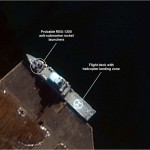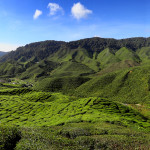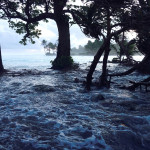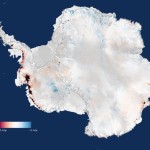- DETERRENCE: The Presidential Nuclear Initiatives of 1991-1992
- DPRK: North Korea’s Senior Nuclear Negotiator Spotted in Beijing
- GOVERNANCE AND CIVIL SOCIETY: Sewol Victims’ Families Form Committee to Demand a Government Investigation
- CLIMATE CHANGE ADAPTATION: Integrating Local Hybrid Knowledge and State Support for Climate Change Adaptation in the Asian Highlands
- ENERGY SECURITY: Unseasonal Rain, Hail in Kutch, Saurashtra
- CLIMATE CHANGE AND SECURITY: Climate Change, Migration, and Non-Traditional Security Threats in China: Complex Crisis Scenarios and Policy Options for China and the World
 DETERRENCE: The Presidential Nuclear Initiatives of 1991-1992, Susan Koch, WMD Case Study 5, October 1, 2012
DETERRENCE: The Presidential Nuclear Initiatives of 1991-1992, Susan Koch, WMD Case Study 5, October 1, 2012
The ROK pushed withdrawal of nuclear weapons but this could not be done in isolation in case the DPRK viewed this as US withdrawal. The Bush Administration’s 1991 global withdrawal of forward-deployed tactical and theater nuclear weapons included Korea but asserted that it could reintroduce nuclear weapons any time, and plans for such were made. [PDF, 0.5MB]
- Command History, 1991, U.S. Pacific Command, volume 1, released under US FOIA to Nautilus institute
- ERIC SCHMITT, “Bush’s Arm Plan; Cheney Orders Bombers Off Alert, Starting Sharp Nuclear Pullback,” New York Times, September 29, 1991
 DPRK: North Korea’s Senior Nuclear Negotiator Spotted in Beijing, Kyodo News Agency in Global Post, 20 May 2014
DPRK: North Korea’s Senior Nuclear Negotiator Spotted in Beijing, Kyodo News Agency in Global Post, 20 May 2014
North Korea appears anxious – threatening nuclear tests, but seems more or less content to continue discussions possibly using the “good offices” of third countries. North Korea also held a trade fair that has increased in size; but trade is meant to support the regime, not supplant it. North Korea also left two new helicopter frigates to be discovered. However, it will take several years of training deployments and a great deal of doctrinal development in order to fully integrate the new capability into North Korea’s conventional deterrence mix.
- Spring International Trade Fair doubles in size, Martyn Williams, NorthKoreaTech.org. (19 May 2014) [Video, 2:18; Video, 0:35]
- North Korea 2012 Minerals Yearbook. U.S. Geological Survey. (March 2014) [PDF, 296 kB]
- New North Korean Helicopter Frigates Spotted, Joseph S. Bermudez, Jr, 38North. (15 May 2014)
 GOVERNANCE AND CIVIL SOCIETY: Sewol Victims’ Families Form Committee to Demand a Government Investigation, Kim Ki-seong, Kim Il-woo and Park Su-ji, Hankyoreh, 17 May 2014
GOVERNANCE AND CIVIL SOCIETY: Sewol Victims’ Families Form Committee to Demand a Government Investigation, Kim Ki-seong, Kim Il-woo and Park Su-ji, Hankyoreh, 17 May 2014
The ROK President promised sweeping reforms following last month’s ferry disaster, while authorities simultaneously take action against citizens protesting the handling of the response. Reporters and staff at a major broadcasting station are striking to protest revelations that coverage was influenced by the Blue House. Family members of victims have established a committee to call for an independent fact-finding investigation into the accident.
- Thousands rally over ferry disaster, Chosun Ilbo (19 May 2014)
- KBS journalists strike to force their boss out, Kim Hee-jin, Joongang Ilbo (21 May 2014)
- South Korea’s Park, sorry over ferry disaster, breaks up coast guard, Jack Kim, Reuters (18 May 2014)
 CLIMATE CHANGE ADAPTATION: Integrating Local Hybrid Knowledge and State Support for Climate Change Adaptation in the Asian Highlands, Jianchu Xu & R. Edward Grumbine, Climatic Change, vol. 124, issue 1-2, pp. 93-104 (May 2014)
CLIMATE CHANGE ADAPTATION: Integrating Local Hybrid Knowledge and State Support for Climate Change Adaptation in the Asian Highlands, Jianchu Xu & R. Edward Grumbine, Climatic Change, vol. 124, issue 1-2, pp. 93-104 (May 2014)
Across the Asian Highlands and beyond, three climate adaption pathways toward the future are suggested. First, in the context of reducing risks from climate change for both communities and governments, more effort must be made to sensitize leaders and policy makers to the interface between local and national interests. Second, government policy should avoid blanket solutions and target specific hybrid knowledge systems in specific places. Third, enhanced political representation with significant resource control for highlands peoples must be established sooner rather than later.
- Upstream, Downstream, China, India: the Politics of Environment in the Himalayan Region, Piers M. Blaikie and Joshua S. S. Muldavin, Annals of the Association of American Geographers, vol. 94, issue 3, pp. 520-548 (2004)
- Innovation as an Expression of Adaptive Capacity to Change in Himalayan Farming, Tor Halfdan Aase, Prem Sagar Chapagain and Prakash Chandra Tiwari, Mountain Research and Development, vol. 33, no. 1, pp. 4-10 (2013)
 ENERGY SECURITY: Unseasonal Rain, Hail in Kutch, Saurashtra, Times of India (7 May 2014)
ENERGY SECURITY: Unseasonal Rain, Hail in Kutch, Saurashtra, Times of India (7 May 2014)
Freak weather or climate change? Which model and which data are needed for an answer, and whose answers are credible? Mango crop losses and air-conditioning demands are real, but flooding and drought are also affected by land use and water management patterns. Is it fossil CO2 or the smog that is the culprit and whose reductions will bring the most human benefit? People do matter.
- El Nino seen choking moisture feed into Bay, Arabian Sea to deny rains, Vinson Kurian, The Hindu Business Line 25 April 2014
- No respite from torrid heat, Prasad Kulkarni, Times of India (3 May 2014)
- Smog in India, China is changing weather patterns in US, finds study: Man-made air pollution in Asia is exacerbating climate change and linked to extreme storm conditions across the Pacific, Renee Lewis, al Jazeera
 CLIMATE CHANGE AND SECURITY: Climate Change, Migration, and Non-Traditional Security Threats in China: Complex Crisis Scenarios and Policy Options for China and the World, Michael Werz and Lauren Reed, Center for American Progress, May 2014
CLIMATE CHANGE AND SECURITY: Climate Change, Migration, and Non-Traditional Security Threats in China: Complex Crisis Scenarios and Policy Options for China and the World, Michael Werz and Lauren Reed, Center for American Progress, May 2014
Pot meets kettle: a useful US analysis of climate change impacts on Chinese security and strategy concludes China’s leaders lack a comprehensive approach to climate security. Meanwhile Boko Haram and a doubling of ice loss in the Antarctic exemplify CNA’s view of climate change and security moving from threat multiplier to direct catalyst of conflict with the accelerating risks of climate change.
- National security and the accelerating risks of climate change, CNA Military Advisory Board (May 2014)
- Behind the rise of Boko Haram – ecological disaster, oil crisis, spy games, Nafeez Ahmed, Earth Insight, Guardian blog (9 May 2014)
- Doubling of Antarctic ice loss revealed by European satellite, Damien Carrington, The Guardian (20 May 2014)
The Nautilus Peace and Security Weekly Report presents articles and full length reports each week in six categories: Austral security, nuclear deterrence, energy security, climate change and security, the DPRK, climate change adaptation and governance and civil society. Our team of contributors carefully select items that highlight the links between these themes and the three regions in which our offices are found—North America, Northeast Asia, and the Austral-Asia region.
- Subscribe to NAPSNet to receive free weekly email reports editor:
Contributors:
- Deterrence: Peter Hayes
- Governance and Civil Society: Dyana Mardon
- Climate Change Adaptation: Saleem Janjua
- DPRK: Roger Cavazos
- Climate Change and Security: Richard Tanter

